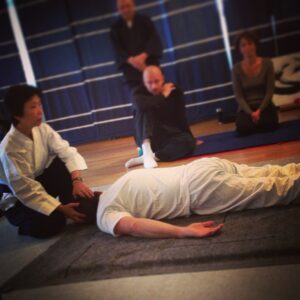Ichigo ichie, a moment, a meeting.
This expression comes to us from Zen and more precisely from the tea ceremony.
It was highlighted by Sen no Rikyu, tea master, in the 16th century, a period of refinement of Zen.
This period was marked by numerous conflicts. It is quite normal that a certain philosophy marking the fragility of life is born. Invitation to a total and unconditional presence in the moment offered, to the ephemeral and unique aspect of our moments.
We enter the same river but the water is different every second.
In Japanese practices, whether in martial arts, No theater, calligraphy, meditation and shiatsu, this concept emphasizes the awareness of each gesture which, even if repeated a thousand times, will be different. Every moment can change from calm to tumult and influence our actions.
Each gesture is different in the moment which cannot be the same.
A moment, a meeting.
The first time I heard this expression was from Kyoko Kishi during a Seiki course. She was demonstrating, I was sitting behind her writing down some thoughts. She looked up and said we needed to focus on feelings. Thinking I was being very discreet, I finished writing down. She then turned to me and asked me to be fully present in what she was doing.
“Each moment, each encounter gives the movement of what is given to do. »
She spoke to us about the importance of being totally present in the moment. Aware of the feelings and needs of the moment without being overwhelmed by the clouds of thoughts.

Each moment is a gift from which we must capture the essence of the fleeting moment.
Our Western minds, educated to speed and store knowledge, risk retaining only the concept.
However, they are much more than words. It is a quality of being. It takes effort and time to capture the subtle nuances of feelings. The effort to redirect the mind towards the feelings of the moment.
If you don’t have time to meditate for half an hour, then take an hour.
We run in all directions, from one activity to another, sometimes with the stress of stopping.
This reminds me of an experience I had about twenty years ago. I was sent to Burkina Faso for a month to provide training to adults. One day, one of my students asked me to come over for tea after class. I plan to stop by his place around 6 p.m. thinking that we will have at most an hour, which gives me time to then go eat and prepare for the next day’s class. This first time seemed endless to me: he lit his little brazier with charcoal, heated a small kettle, rinsed the teapot and threw away the water. He relighted the brazier and boiled water for the first tea. I felt very agitated to see his slow and non-challenging gestures which went to the rhythm of the little brazier. It lasted 2 and a half hours.
This reminds me of an experience I had about twenty years ago. I was sent to Burkina Faso for a month to provide training to adults. One day, one of my students asked me to come over for tea after class. I plan to stop by his place around 6 p.m. thinking that we will have at most an hour, which gives me time to then go eat and prepare for the next day’s class. This first time seemed endless to me: he lit his little brazier with charcoal, heated a small kettle, rinsed the teapot and threw away the water. He relighted the brazier and boiled water for the first tea. I felt very agitated to see his slow and non-challenging gestures which went to the rhythm of the little brazier. It lasted 2 and a half hours.
That evening, I returned to my room challenged to become aware of my mental turmoil as a Westerner in a hurry.
Why be in such a hurry?
A few days later I was invited again for tea. I surrendered to the moment or moments. We were in the family’s backyard, people were coming and going, the kids were playing and we were there just enjoying the moment. I had the impression that everything around was going at accelerated speed and that we were just in rhythm with nature. The two small glasses of bitter tea took 4 hours. 4 hours of suspended time. I have seen the sunset that sets the earthen walls ablaze for fleeting seconds, I have heard the sounds of Ouagadougou change with nightfall, I have seen the embers that need time to heat and give their heat to just the right amount of water for the small teapot. I tasted each sip, and the glasses only contained 3, hot, sweet and bitter, taking up all the space in my mouth and sliding down to my stomach. The abandonment in each moment was evident and so precious.
Brief
So, whether during a treatment or in everyday life, being able to smell. To get there, it first requires a little effort: that of coming to “here and now”. Stop ruminating on an outdated past. Do not anticipate a hypothetical future.
When we bring our concentration back to now, we feel our awareness expanding to include a whole series of sensations. Breathing calms down, deep relaxation occurs. With repetition and experience, this state becomes easier and easier to achieve. An awareness of what is happening within us becomes clearer, clearing the immense sky of the encounter of the moment.






Recent Comments